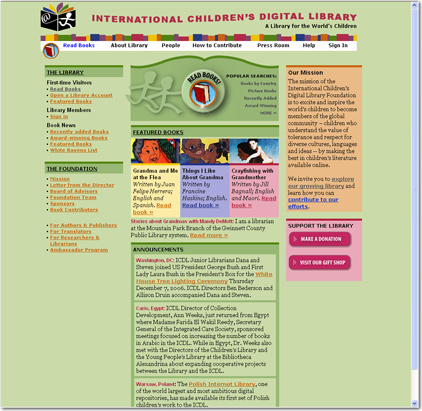 |
Overview
The ‘International Children’s Digital Library’ (ICDL) (www.icdlbooks.org) is an online library for the world’s children developed by Allison Druin, Ben Bederson, Ann Weeks, and researchers from the University of Maryland. To support this mission, research is being conducted on how children access and use digital books to explore diverse cultures.
With over 1000 books, from more than 200 countries in 35 languages, ICDL is the world’s largest international library online for children, ages 3–13. Figure 1 below shows the introductory screen for the ICDL. This interface is available in 10 different languages.
The ‘ICDL Communities’ project explores the social context surrounding next generation learners and how they share books. This research focuses on how to support an online global community of children who don’t speak the same languages but want to share the same digital resources and interact with each other socially, learn about each others’ cultures, and make friends even if they do not speak the same language. Using specially developed tools, children communicate inter-culturally, create and share stories, and build cross-cultural understanding.

Figure 1 The homepage of the International Children's Digital Library
This case study reports the results of three rounds of evaluations during the iterative development of the ICDL Communities software with children in three pairs of countries: Hungary/USA; Argentina/USA; Mexico/USA (Komlodi et al., 2007). In the early evaluations the researchers investigated how the children liked to represent themselves and their team using paper (Figure 2). In later prototypes the children worked online in pairs using tablet PCs (Figure 3).
The findings from each round of evaluation enabled the researchers to learn more about the children’s needs, which enabled them to extend the functionality of the prototype and refine its usability and sociability. As the development proceeded it became clear that it was essential to support the entire context of use, including providing team-building activities for children and support for teachers before using the online tools.
Figure 2 American children make drawings to represent themselves and their community
Figure 3 Mexican children working with an early prototype using a tablet PC
From these evaluation studies researchers learned that: children enjoy interacting with other children form different countries and a remarkable amount of communication takes place even when the children do not share a common language; identity and representation are particularly important to children when communicating online; drawing and sharing stories is fun; providing support for children and teachers off-line as well as online is as essential as developing good software for the success of this kind of activity.
References
Komlodi, A., Alburo, J., Preece, J., Druin, A., Hou, A., Liao, S., Elkiss, A. and Resnik, P. (2007) Lessons learned for developing an international children’s online community: evaluating sociability and usability for cross-cultural exchange. The Interdisciplinary Journal, Interacting with Computers. In press.
|
 |

